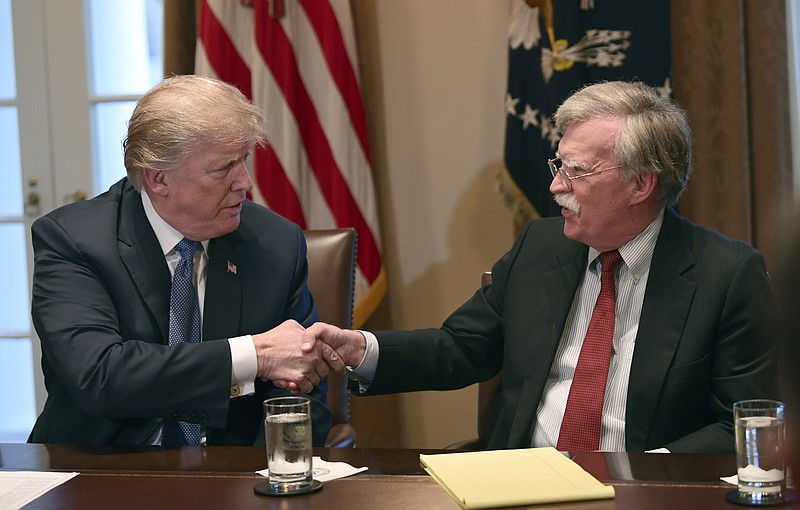WASHINGTON (AP) - President Donald Trump on Tuesday abruptly forced out John Bolton, his national security adviser with whom he had disagreements on Iran, Afghanistan and a cascade of other global challenges.
The sudden shake-up marked the latest departure of a prominent voice of dissent from the president's inner circle, as Trump has grown less accepting of advice contrary to his instincts. It also comes at a trying moment for Trump on the world stage, weeks ahead of the United Nations General Assembly and as the president faces pressing decisions on difficult foreign policy issues.
Tensions between Bolton, Trump's third national security adviser, and other officials have flared in recent months over influence in the president's orbit and how to manage his desire to negotiate with some of the world's most unsavory actors. Since joining the administration in the spring of last year, Bolton has espoused skepticism about the president's whirlwind rapprochement with North Korea, and recently has become a vocal internal critic of potential talks between Trump and leaders of Iran and Afghanistan's Taliban.
Bolton also broke with Trump with his vocal condemnation of Russia's global aggressions, and last year he masterminded a quiet campaign inside the administration and with allies abroad to persuade Trump to keep U.S. forces in Syria to counter the remnants of the Islamic State and Iranian influence in the region. Bolton's maneuvering at the time contrasted with former Secretary of Defense Jim Mattis' decision to instead resign over Trump's December withdrawal announcement, which has been effectively reversed.
On Twitter Tuesday, Trump and Bolton offered opposing accounts on the adviser's less-than-friendly departure, final shots for what had been a fractious relationship almost from the start.
Trump tweeted he told Bolton on Monday night his services were no longer needed at the White House and Bolton submitted his resignation Tuesday morning. Bolton responded in a tweet of his own that he offered to resign Monday "and President Trump said, 'Let's talk about it tomorrow.'"
Trump explained he had "disagreed strongly" with many of Bolton's suggestions as national security adviser, "as did others in the administration."
Bolton's letter of resignation, dated Tuesday, was only two sentences long. He wrote: "Dear Mr. President, I hereby resign, effective immediately, as assistant to the president for national security affairs. Thank you for having afforded me this opportunity to serve our country." He signed the letter "Sincerely, John R. Bolton."
South Carolina Sen. Lindsey Graham, who had been traveling with Trump on Monday, said reports of Bolton's opposition to a now-scrapped weekend meeting with the Taliban at Camp David was a "bridge too far" for Trump.
And one Republican familiar with the disagreements between Trump and Bolton said the adviser's opposition to a possible meeting between Trump and Iranian President Hassan Rouhani was a precipitating factor. French President Emmanuel Macron has been trying to broker such a meeting, possibly on the sidelines of the upcoming U.N. General Assembly, in hopes of salvaging the international Iran nuclear deal from which Trump withdrew.
"There were many times that Ambassador Bolton and I disagreed. That's to be sure," Secretary of State Mike Pompeo said Tuesday. He added that Trump has been clear that he is willing to meet with Rouhani "with no preconditions."
Treasury Secretary Steven Mnuchin, who appeared with Pompeo at the White House, volunteered: "The president's view of the Iraq war and Ambassador Bolton's was very different."
A former Bush administration official, Bolton has championed hawkish foreign policy views dating back to the Reagan administration and became a household name over his vociferous support for the Iraq war as the U.S. ambassador to the U.N. under George W. Bush. Trump initially supported the 2003 U.S. invasion, but subsequently became a vocal critic.
The Iranian government hailed Bolton's departure, and spokesman Ali Rabiei said it might pave the way for warmer relations. "By dismissal of the biggest supporter of war and economic terrorism, the White House will face less barrier to understand realities of Iran," he said in a tweet. Tehran calls the U.S. sanctions on Iran "economic terrorism."
Pompeo said, "I don't think any leader around the world should make any assumption that because some one of us departs that President Trump's foreign policy will change in a material way."

